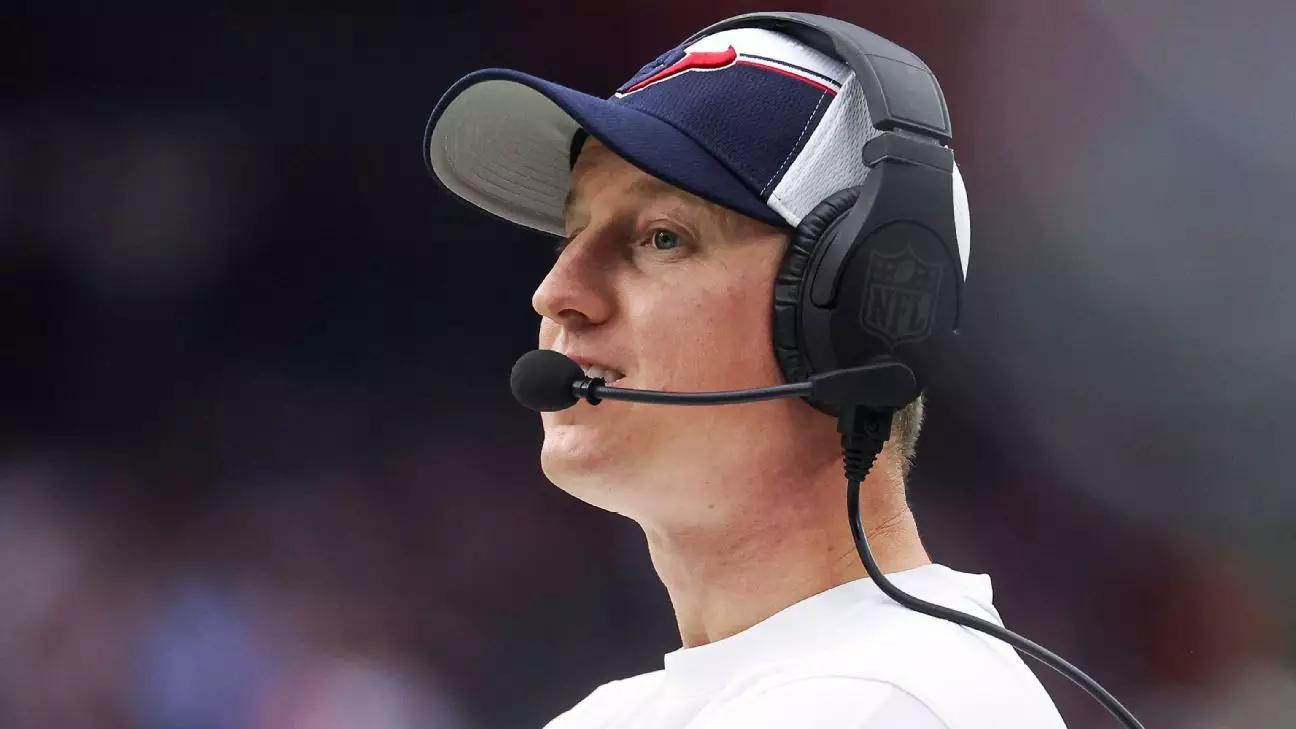In a bold move signaling a shift in strategic direction, the Houston Texans have officially parted ways with offensive coordinator Bobby Slowik after two seasons, as reported by ESPN. This decision comes on the heels of a season marked by both success and considerable shortcomings. The Texans, having clinched the AFC South title and reached the divisional round for the second consecutive year, faced criticism over their offensive performance, prompting a broader evaluation of the coaching staff, including the dismissal of offensive line coach Chris Strausser and assistant offensive line coach Cole Popovich.
Under Slowik’s stewardship, the Texans’ offense exhibited significant inconsistencies throughout the 2024 season. Despite finishing the regular season with a commendable 10-7 record, the offensive unit ranked 18th in scoring, averaging a mere 22.1 points per game, and placed 16th in total offense, with 329 yards per contest. Such statistics underline the disparity between the team’s overall success and its struggles on the offensive end.
One of the most troubling facets of the Texans’ offensive performance was the alarming rate of quarterback C.J. Stroud’s exposure to pressure. Stroud was sacked 52 times—a statistic that ranked second in the league—as he experienced pressures on 38.6% of his dropbacks. This predicament was exacerbated by a concerning average time to pressure of 2.59 seconds, meaning defenses were able to disrupt plays before the offense could establish any rhythm. The Texans’ inability to adapt to defensive schemes, particularly against twists and stunts, resulted in 52 unblocked pressures, severely hampering Stroud’s effectiveness.
Stroud’s regression in Year 2 was palpable. Following an impressive rookie campaign where he ranked eighth in the league in passing yards, his performance dipped significantly. The quarterback finished the season with only 3,727 yards and 20 touchdowns, tied for 15th in both categories. Despite boasting talented Pro Bowl teammates like left tackle Laremy Tunsil and running back Joe Mixon, Stroud struggled to find his footing, suggesting deeper issues within the offensive scheme.
The Texans consistently faltered in crucial moments, particularly in the second half of games, where they averaged a league-worst 7.5 points. Their inability to capitalize on critical opportunities was glaring. A particularly troubling stretch from Week 7 to Week 12 saw them go without scoring an offensive touchdown, showcasing a lack of creativity and execution that would raise questions about the playcalling and adjustments made on the field.
Head coach DeMeco Ryans, who had a previous working relationship with Slowik during their tenure with the San Francisco 49ers, expressed a need for improvement during the season’s conclusion. While he acknowledged some growth under Slowik’s leadership, his remarks were cautious and lacked the enthusiasm one might expect following a division title. Ryans indicated that a comprehensive evaluation of the offensive staff would be necessary when selecting a new offensive coordinator, hinting at a potential overhaul.
The addition of star players such as wide receiver Stefon Diggs and Mixon had raised expectations heading into 2024. However, injuries—most notably Diggs’ season-ending ACL injury during Week 8—interrupted any momentum the offense hoped to achieve. Despite Mixon’s thousand-yard season, overall performance was muddled by inefficiencies, evidenced by poor third-down conversion rates and red zone scoring success.
With the firing of Slowik and subsequent coaching changes, the Texans signal their commitment to revitalizing an offense that has, despite flashes of brilliance, consistently failed to perform at a competitive level. The upcoming hiring of a new offensive coordinator will be crucial in reshaping the unit’s identity and maximizing Stroud’s potential. As the Texans prepare for a critical offseason, fans and analysts alike will be keenly watching to see how they address these glaring issues and position themselves for success in the coming seasons. It will be imperative for Ryans and his staff to cultivate an environment conducive to growth, ensuring that the Texans can transition from the shadow of their struggles into a phase of offensive innovation and efficiency.

